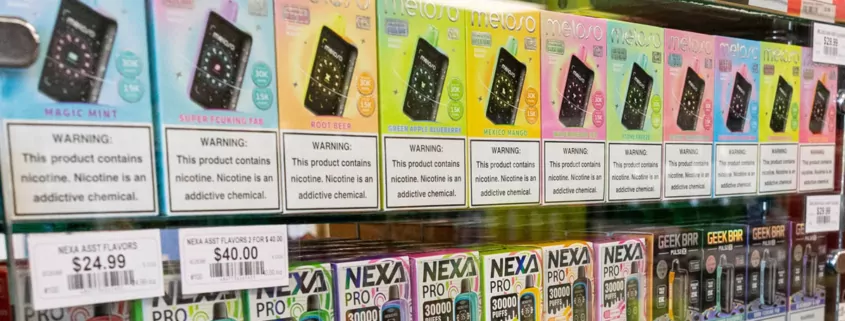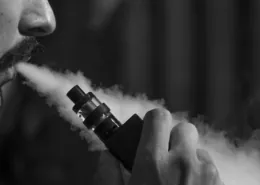Oregon Bill Proposes Limiting Flavored Vape & Tobacco Sales Exclusively to Liquor Stores
Measure Sparks Debate Between Public Health Advocates and Retailers Over Youth Access and Economic Impact
Oregon lawmakers are grappling with a revised proposal aimed at curbing teen vaping by significantly restricting access to flavored tobacco and nicotine products. After a previous attempt to enact a full ban failed, Senate Bill 702 has been amended to prohibit the sale of these popular products anywhere except state-licensed liquor stores.
The move represents a significant shift, potentially removing flavored vapes, menthol cigarettes, and other flavored nicotine items from thousands of convenience stores, gas stations, grocery stores, and smoke shops, concentrating their availability within Oregon’s 282 regulated liquor outlets. Proponents, including pediatricians and public health organizations, argue this is a necessary step to combat youth addiction, while opponents, primarily retailers, warn of devastating economic consequences and the potential growth of an illicit market.
What SB 702 Proposes
The amended SB 702 seeks to ban the distribution and sale of flavored inhalant delivery systems (vapes) and flavored traditional tobacco products statewide, with a specific exemption allowing sales only within stores licensed by the Oregon Liquor and Cannabis Commission (OLCC). The definition of “flavored” is broad, encompassing not just fruit and candy tastes but also “menthol, mint, wintergreen, chocolate, cocoa, vanilla, honey,” and sensations described as “chill, ice, fresh, arctic or frost or a minty or cooling effect.” Products flavored only like cannabis would be exempt. The bill also explicitly allows local governments to enact even stricter regulations.
Arguments for Restriction: Protecting Youth
Supporters of the bill, led by figures like pediatrician Sen. Lisa Reynolds (D-Portland), frame it as crucial for protecting young people. Sen. Reynolds highlighted products seemingly designed for youth appeal, such as vapes with built-in games or candy flavors like cotton candy. “I feel like this is definitely marketed to kids who would never smoke a combustible cigarette, and nicotine is among the most highly addictive chemicals on the planet, and then you’re hooked for life,” she stated.
Public health groups like the American Lung Association in Oregon, the Hospital Association of Oregon, and the Oregon Medical Association strongly support the measure. They cite data indicating that three out of four Oregon youth who use tobacco use flavored varieties, compared to only 13% of adults over 35. They emphasize that tobacco remains the leading cause of preventable death in Oregon, costing thousands of lives and billions in economic impact annually. The Oregon Education Association also testified in favor, linking the rise in youth vaping to increased classroom disruptions.
Arguments Against: Economic Harm and Illicit Markets
Opposition comes primarily from retailers who stand to lose significant revenue. Vape shop owners, convenience store operators, and grocers argue the bill unfairly punishes legitimate businesses and won’t effectively stop youth access. The Northwest Grocery Retail Association warned the restriction would simply shift sales “away from regulated, tax-collecting businesses and drive them into unregulated markets.”
Specific retailers quantified the potential damage. Dari-Mart Stores estimated a $2 million annual loss from flavored nicotine products across its 39 locations, potentially forcing a 10% staff reduction. Johnathan Polonsky of Plaid Pantry argued the bill ignores the ease of online purchasing, demonstrating how simple it was to order flavored vapes online with minimal age verification. Employees at Leaf Life smoke shops estimated that 70% of their sales involve products targeted by the bill, potentially requiring significant layoffs.
Retailers also pushed back against the implication that liquor stores inherently have better age verification practices. Leaf Life manager Bryant Heckman noted his stores undergo regular compliance checks without violations, stating, “We do our absolute best… because frankly, I don’t want to lose my job.”
Legislative and Legal Context
This amended bill follows the failure of a similar, broader ban proposal during the 2023 legislative session. SB 702 currently awaits a hearing in the Senate Committee On Finance and Revenue, pending an analysis of its potential impact on state revenue.
Meanwhile, local efforts to ban flavored products face ongoing legal battles. Ordinances passed by Multnomah County and Washington County have been upheld by the Oregon Court of Appeals, but their implementation is paused as the cases proceed, with the Oregon Supreme Court scheduled to hear arguments regarding the Washington County ban in June. These local fights underscore the contentious nature of flavored tobacco regulation statewide.
The fate of SB 702 remains uncertain, balancing the urgent public health goal of reducing youth nicotine addiction against concerns about economic impacts on local businesses and the risk of inadvertently strengthening unregulated, illicit markets.
- Mexico Passes Law to Ban Tobacco Ads, Expand Smoke-Free Zones - August 13, 2025
- Big Vape Brands Bypass Ad Bans Via Global Social Media - August 13, 2025
- UK to Make Vape Sellers Pay for E-Waste Disposal - August 13, 2025






